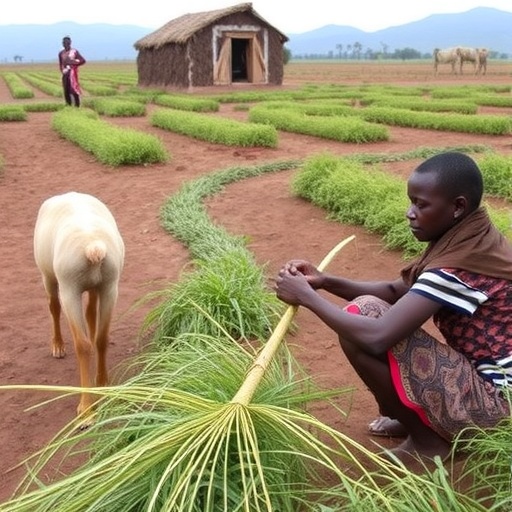In recent years, climate change has dramatically altered climatic patterns across the globe, leading to profound implications for agriculture and food security. In Northern Ethiopia, where smallholder farmers and agro-pastoral communities form the backbone of the agricultural sector, the ramifications are particularly severe. A recent study led by Alhassan, Teklehaimanot, and Solomon highlights the perceptions of these communities regarding climate change and its impacts on their livelihoods, as well as the trends that have emerged in response to escalating environmental challenges.
The landscape of Northern Ethiopia is characterized by its diverse agricultural practices, which are predominantly subsistence-based. Smallholder farmers rely on locally adapted crops and traditional farming methods, inherently tied to the region’s climatic conditions. However, shifting weather patterns, prolonged droughts, and unexpected rainfall have disrupted these age-old systems. The farmers’ adaptive strategies and their perceptions of climate variability play a crucial role in determining their resilience to these changes.
The farmers in Northern Ethiopia often witness firsthand the effects of climate change, which affect crop yields and livestock health. Many report increasing unpredictability in seasonal weather, making it challenging to plan agricultural activities effectively. This unpredictability leads to decreased yields, prompting these communities to grapple with food insecurity and economic instability. Consequently, the responses to these climatic challenges reflect a remarkable capacity for adaptation, albeit one that is continually tested.
In addition to direct impacts on crop production, climate change poses risks to water availability and quality in the region. Water scarcity has become a pressing concern, with communities relying on seasonal rains that are no longer reliable. The study underscores how farmers have started to innovate water-saving technologies and practices to secure irrigation for their crops. Despite their resourcefulness, a significant knowledge gap remains regarding sustainable water management practices that could enhance resilience to climate-induced water stress.
Livestock plays a fundamental role in the livelihoods of agro-pastoral communities in Northern Ethiopia. These herders face challenges from both adverse weather conditions and changing ecosystems that impact pasture availability. The study reveals alarming trends in livestock health as rising temperatures and prolonged dry spells increase the vulnerability of animals to diseases. The farmers’ perceptions highlight a growing concern over the sustainability of traditional pastoral practices and the urgent need for integrated approaches that encompass livestock health, nutrition, and access to veterinary services.
Local knowledge and traditional practices shape the response of these agricultural communities to climate change. The findings of the study emphasize the importance of incorporating indigenous knowledge systems into the broader discourse on climate adaptation. Farmers possess invaluable insights into their environment, having developed time-tested strategies for coping with seasonal variations. By valuing and integrating this knowledge into policy frameworks, stakeholders can enhance the effectiveness of adaptation strategies.
Governments and development agencies must recognize that external interventions alone cannot ensure sustainable adaptation. The sense of ownership among the farmers is crucial, and engaging communities in decision-making processes will lead to more successful outcomes. The study outlines how participatory approaches that enable farmers to voice their concerns can instigate meaningful change, fostering resilience in the face of climate challenges.
Moreover, access to information plays a pivotal role in how communities respond to climate change. The study reflects a growing demand for climate-related education and awareness programs among rural populations in Northern Ethiopia. As farmers gain insight into climate dynamics, they become better equipped to implement adaptive measures. Collaborative efforts between local organizations and research institutions are critical in disseminating knowledge and fostering a culture of innovation aimed at climate resilience.
The study also sheds light on gender dynamics within farming communities. Women’s roles, especially in food production and family nutrition, are often overshadowed in discussions around climate change. Empowering women with resources, education, and decision-making power regarding climate adaptation can yield significant benefits for entire households. By recognizing the unique challenges faced by women, the agricultural landscape can become more equitable and effective in addressing climate impacts.
Furthermore, the impacts of climate change are not isolated; they are intertwined with socio-economic factors such as poverty, infrastructure, and market access. The study highlights the need for a holistic approach that addresses these multifaceted challenges. Policies aimed at improving infrastructure and market access must complement climate adaptation initiatives to create a conducive environment for sustainable agricultural development.
As the evidence mounts regarding the impacts of climate change on agriculture, the urgency for collective action becomes increasingly apparent. The study argues for concerted efforts among government, NGOs, and community stakeholders to devise comprehensive strategies that promote resilience. With an integrated approach, it is possible to mitigate the adverse effects of climate change while uplifting vulnerable communities.
In conclusion, the research conducted by Alhassan and colleagues offers a comprehensive overview of the perceptions and responses of smallholder farmers and agro-pastoral communities to climate change in Northern Ethiopia. By emphasizing local knowledge, gender equity, and socio-economic considerations, the study provides a roadmap for sustainable agricultural practices that can thrive in a changing climate. Addressing climate change is not just an environmental imperative but a matter of social responsibility, ensuring that the voices of those most affected are heard and integrated into decision-making processes.
Recognizing the challenges that lie ahead, it is now up to policymakers, researchers, and communities to collaborate effectively. Climate change may pose significant threats, but through innovation, education, and resilience-building efforts, Northern Ethiopia can forge a path toward a sustainable agricultural future.
Subject of Research: Impacts of climate change on smallholder farmers and agro-pastoral communities in Northern Ethiopia.
Article Title: Perception and trends of climate change: assessing impacts on smallholder farmers and Agro-Pastoral communities in Northern Ethiopia.
Article References:
Alhassan, I., Teklehaimanot, A., Solomon, N. et al. Perception and trends of climate change: assessing impacts on smallholder farmers and Agro-Pastoral communities in Northern Ethiopia. Discov Agric 3, 106 (2025). https://doi.org/10.1007/s44279-025-00272-x
Image Credits: AI Generated
DOI: 10.1007/s44279-025-00272-x
Keywords: climate change, smallholder farmers, agro-pastoral communities, Northern Ethiopia, resilience, local knowledge, adaptation strategies.




